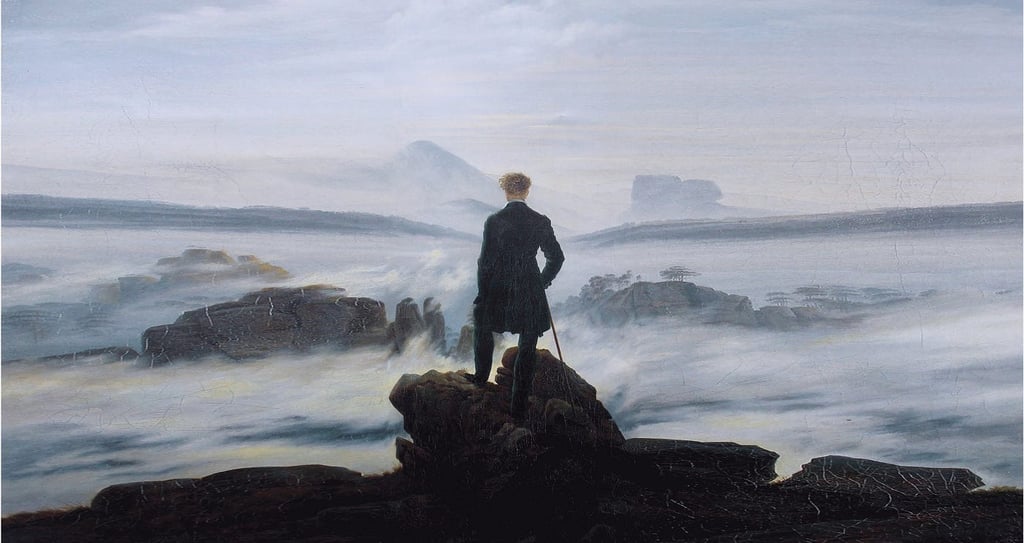On Meaning, Mortality, and the Messiness of Living
In this reflective essay, we explore the relationship between life, death, and meaning as an ongoing journey, not a set destination.
PHILOSOPHY


Hi all! Before we get into the article let me introduce you to our first guest author! His name is Arthur Vasconcelos and he’s a Brazilian writer with a passion for science, mathematics, and philosophy. In this reflective essay, he will explore the relationship between life, death, and meaning, much more seriously than I would, so hey, look at that our first serious article on the blog!
Of course, I wouldn’t leave you all alone with a strange man, I’m still gonna be in there in the form of (red brackets, just like this, giving my commentary and such). So, let me know if you like this kind of format! We’ll probably do it again at some point, because I’m quite busy these days and I appreciate guest authors covering for me from time to time. Anyway, let’s get onto the article...
Does life make sense without death? At first glance, the answer may seem obvious. Most people would reply without hesitation: “No, of course not! It is precisely the awareness of death that urges us to truly live, although those who remain paralyzed by the fear of dying, in fact, do not live at all.” And in a certain sense, they are right.
(Honestly, I’m amazed at the eloquence of these “most people”. I mean where are these people hiding?! In my experience most people would say something like “Who cares?! Did you catch the game last night?” Sorry, if I just made you lose the game.)
Yet, how can we explore the labyrinthine depths hidden within this answer?
The Courage of Living
To live is an act of courage. The moment human beings became conscious of themselves, aware of their needs, desires, instincts, and of their own fragile existence in a vast universe, they also became aware of the existential emptiness that comes with such knowledge. (Again, way too much credit given to an average mindless zombies we call a human being.)
Once we transcend the primitive instinct of survival, we also embrace the possibility of a life rich in experience, a life liberated from blindness to itself.“You will know the truth, and the truth will set you free.” But to be free is also to be lost.
A man born blind who miraculously gains sight may rejoice, but he will also be disoriented. Where should he go? Likewise, faced with existence, we are left with two guiding questions: “Is life worth living?” and “What should we do with the limited time we are given?”
The Dialogue of Body and Mind
The body and the mind are distinct entities, each speaking its own language. Animals hunt for food in obedience to the body. Humans hunt for meaning in obedience to the mind.
In contemporary society, the needs of the body are more easily satisfied than ever before. What remains is an overabundance of possibilities, a maze of choices that often leads to disorientation.
Too many paths can create a sense of emptiness. Out of this void emerge insecurities about how to think, how to act, how to speak, how to live. In response, we often grasp at fleeting pleasures that dissolve quickly. Yet it is the voice of the mind that calibrates whether life is meaningful. (I always found it rather fascinating how a lot of people seem to hold to the idea that life is inherently meaningless and yet cling onto some sort of meaning. I can sure understand that everyone is capable of giving themselves meaning, but I cannot quite grasp how such a self-referential, circular, solipsistic meaning can be fully satisfactory to anyone.)
Still, the mind cannot act without the energy of the body. One cannot exist without the other.
Identity and Transformation
In the search for balance, we are in constant conflict. Perhaps the value of life lies precisely in the subjectivity each one of us carries. Our individual identity is shaped by the vocabulary of our minds, by the network of knowledge and beliefs that we weave around ourselves. Each idea and memory forms a piece of a puzzle that composes the image we recognize as “ourselves.”
Some pieces are lost, others replaced, as we are transformed by time. What remains forms the roots of our singularity, our childhood, adolescence, adulthood, and old age. Along the journey, we gather fragments, we lose others, we preserve a few in the vault of the heart. Some we cherish, others we would rather forget. And yet, like the phoenix, we are reborn from our own ashes, reshaped by the fire of will.
Meaning in the Journey
Perhaps meaning is not found in a final destination, but in the journey itself. For it is the journey that molds us into who we are. (So, it’s about the journey not the destination...because it gets us to the destination of who we are today??)
In life, two certainties remain unshakable: we are born, and we die. (And taxes) What lies between these two events is the time entrusted to us. And it is within this brief interval that we must learn to live.
Arthur Vasconcelos
Subscribe to the newsletter
Get updates on new posts, projects, and occasional thoughts and reflections! Basically, whatever's on my mind straight to your inbox.
